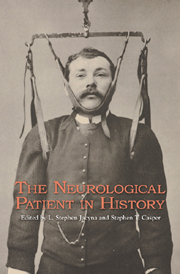Book contents
- Frontmatter
- Contents
- Preface
- Acknowledgments
- Introduction
- Part One Medicine Constructs the “Neurological Patient”
- Part Two Public and Private Constructions of the “Neurological Patient”
- Part Three Patient Groups Construct the “Neurological Patient”
- Part Four The Patient Constructs the “Neurological Patient”
- Part Five Historians Construct the “Neurological Patient”
- Bibliography
- List of Contributors
- Index
Preface
Published online by Cambridge University Press: 12 September 2012
- Frontmatter
- Contents
- Preface
- Acknowledgments
- Introduction
- Part One Medicine Constructs the “Neurological Patient”
- Part Two Public and Private Constructions of the “Neurological Patient”
- Part Three Patient Groups Construct the “Neurological Patient”
- Part Four The Patient Constructs the “Neurological Patient”
- Part Five Historians Construct the “Neurological Patient”
- Bibliography
- List of Contributors
- Index
Summary
It is now a quarter of a century since Roy Porter began examining the place of the patient in the history of medicine and health. It thus appears an appropriate moment to revisit the historical development of the patientdoctor relationship and the privileging of the patient's perspective—themes that have animated historians of medicine since the mid-1980s. While this volume is concerned with the history of a specific patient, the neurological patient, its essays reveal that many interesting lacunae and unquestioned assumptions about the patient proper remain poorly examined. Among these, the most striking is that historians have too readily employed an essentialist and ahistorical conception of the patient in their historical analysis. In other words, the question of how the patient has been constituted in the era of modern medicine has too often been ignored.
All of the essays assembled in this volume begin the work of addressing that problem. The authors first gathered together for a workshop entitled The Neurological Patient in History, sponsored by the Wellcome Trust Centre for the History of Medicine at University College London in the winter of 2008. Although the historical approaches and perspectives of the authors varied, all the attendees agreed that the workshop had facilitated an unusually coherent attempt to study a complex skein of issues raised by the history of the patient proper and the neurological patient in particular.
- Type
- Chapter
- Information
- The Neurological Patient in History , pp. vii - viiiPublisher: Boydell & BrewerPrint publication year: 2012



